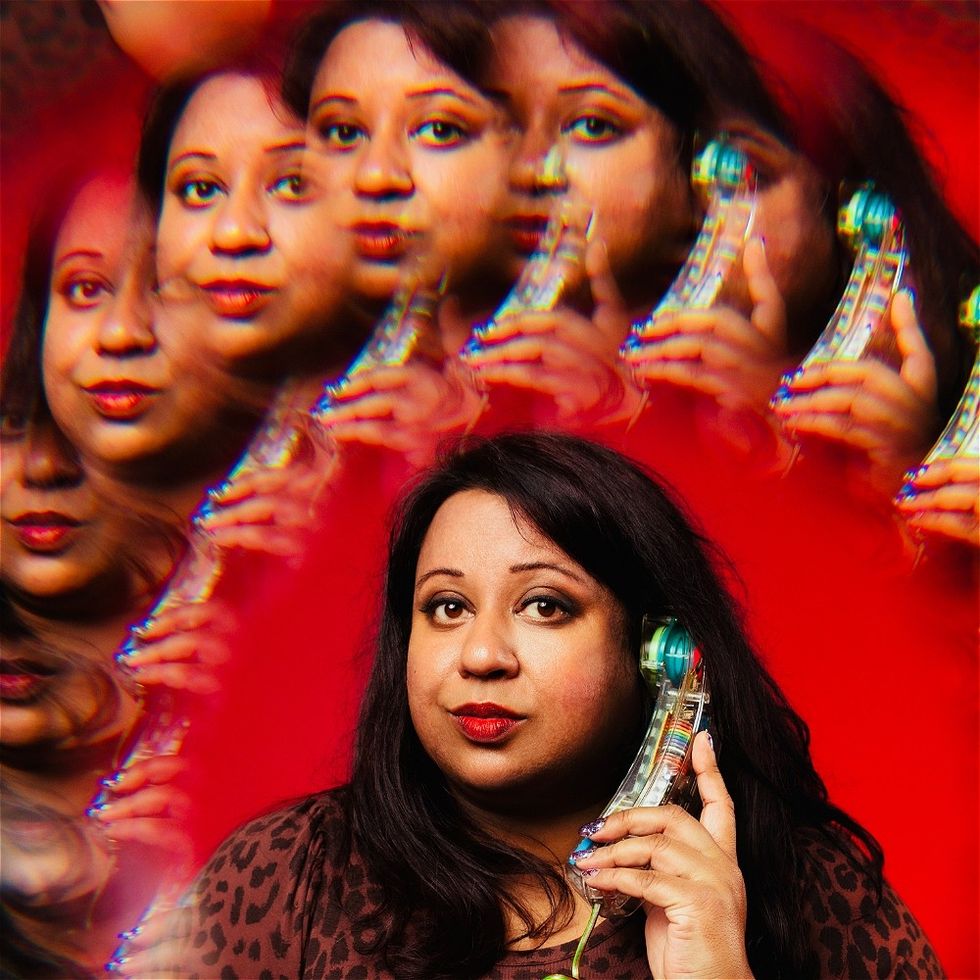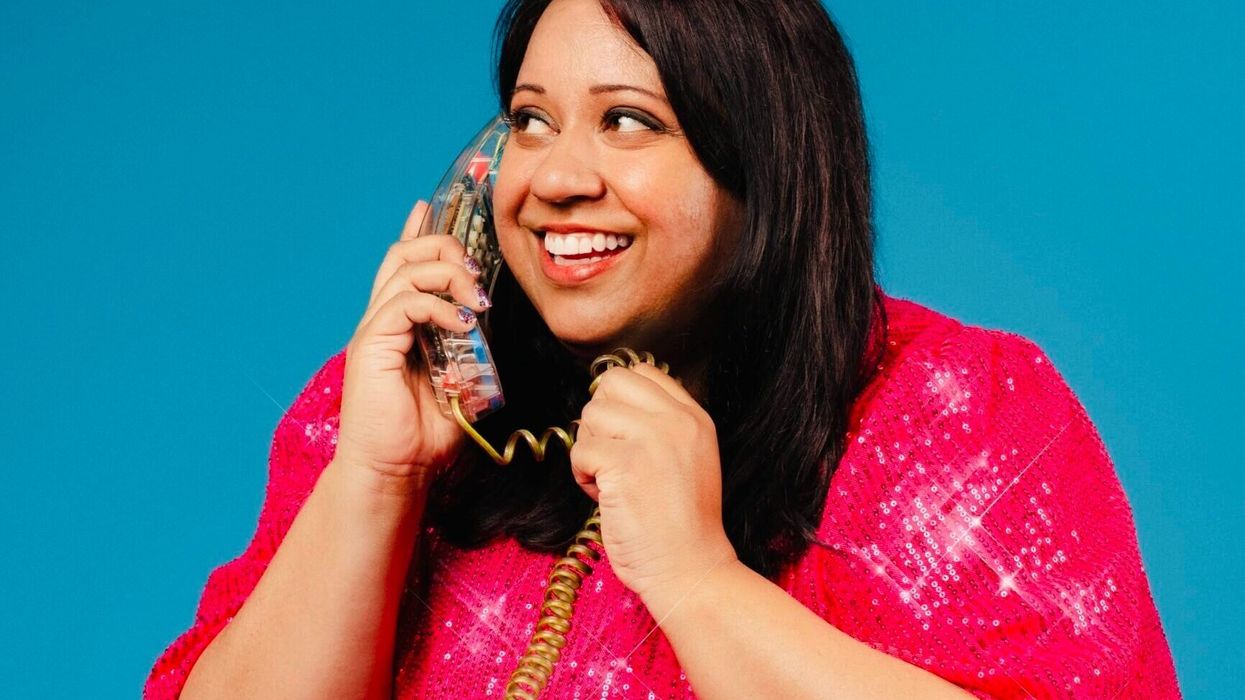WHETHER it has been writing for radio and TV or delivering special solo stand up shows, Suchandrika Chakrabarti has provided plenty of laughs since she found her comedy calling in 2020.
The top British talent, who also runs a monthly comedy night, has followed up her acclaimed show I Miss Amy Winehouse with the equally loved Doomscrolling, which she is taking to this year’s Edinburgh Fringe. Doomscrolling has delighted audiences around the UK and sees her tackling the online era in a fun way.
Eastern Eye got the British Asian talent to select her top 10 standout moments from what is proving to be an action-packed comedy career.
End-of-course show: I’d always loved watching stand-up, but never thought I could do it. And as a busy newsroom journalist, I didn’t have time. By January 2020, I was freelancing and decided to give stand-up a go with a comedy course at the Bill Murray in London. The end of-course show, which took place at the venue in late February 2020, was an incredible gig and gave me this feeling I wanted to chase.
Comedy competitions: In summer, 2020, when I entered the world of live comedy it had ceased to exist (due to lockdown). I could take it personally, or just be glad that I had the video of my set from the end-of-course show, which would give me some comic momentum. It got me onto online gigs, into the Funny Women Stage Awards (I came away a semi-finalist and ‘one to watch’) and into the British Comedy Guide Pro Performance Award (as a finalist).
Writing for radio: I began writing for Radio 4 in September 2020, first on The News Quiz, and then on The Now Show (RIP). It was a wonderful opportunity to sit in a writer’s room with very accomplished and talented people and come up with jokes based on the week’s news with them. Working on the shows introduced me to the value of collaboration. My former career also came in handy.

Writing my first Edinburgh show (May 2021): I quickly reached a point where a five-minute comedy set was restrictive. But that is the basic currency of comedy at the earlier levels. Frustrated by this, I set myself the task of writing my first Edinburgh show in a month, and booked myself into Brighton and Camden Fringes to make sure I did it. The result was my debut comedy hour, I Miss Amy Winehouse, a show about the solutions for grief, which I ended up taking on tour until November 2022.
My first international comedy festival (July 2022): I kept working on I Miss Amy Winehouse through the year, taking it to audiences around the country, and, in one memorable week, to Amsterdam for the Boom Chicago Comedy Festival. It was exciting to be invited to perform at a festival outside the UK. I got to do my show in an old theatre, with a welcoming crowd who love their English-language comedy.
Full Edinburgh Fringe run: I took I Miss Amy Winehouse for the whole month of Edinburgh Fringe 2022. It was an incredible experience, performing my hour-long show every day. I learnt a lot about myself as a comedian, about my ability to improvise and how an audience of four can sometimes laugh louder than a fuller venue, if the chemistry is working. There were other lessons about partying, going big on karaoke and needing suitcases full of throat lozenges, which I needed to learn.
First sell-out show: In July 2022, I started writing my current show Doomscrolling, in which I try to explain the news and our chronically online era to my five-year-old niece. By February 2023, I had my first sold-out show at VAULT Festival (RIP) in London. Writing a comedy show about the news machine, I was initially tempted to keep the content very topical, but that doesn’t work with the long lead times of a solo show. I realised that Doomscrolling has more impact when it’s based around my relationship with my niece.
Writing on Have I Got News For You (HIGNFY): In March 2023, I found a different outlet for my topical comedy, writing on a BBC One TV show I’ve been watching since childhood. As much as I love creating my solo shows, there is nothing like a writer's room, especially with more experienced writers who guided me through picking up HIGNFY’s tone. It was an incredible moment when I first saw my name in the iconic end credits. I’m intrigued to see how a change of government affects the writer’s room.
Running a comedy night in London: The downside of starting stand-up comedy during lockdown was that it took much longer to meet collaborators and make friends. I launched a monthly comedy club in north London in November 2023, called Good News/Bad News (relaunching as Mock The Month this October). It’s been a great way to work with other stand-ups, character comedians and clowns. As the host, I’ve tried character comedy and improvisation, moving away from my tendency to lean on pre-written scripts, and to embrace the unpredictable joy of live comedy.
Doomscrolling – Fringe 2024: I’m taking my second solo comedy hour, Doomscrolling to the Edinburgh Fringe, with shows starting on Thursday (15). I’m really excited about performing this through most of August. It’s a silly show filled with real, absurd headlines and cute characters. You even get to hear a bit from my small niece. It’s a fun show happening in a yurt and I’m cracking out my Cruella Braverman wig. Come along and find out what the orcas are up to with all the sinking of billionaires’ yachts, and why that matters.
Suchandrika Chakrabarti: Doomscrolling at Hootenannies @ Potterrow – Big Yurt, Edinburgh EH8 9AA from Thursday (15) to next Sunday (25). www.edfringe.com and Instagram: @suchandrika.




